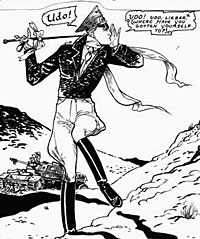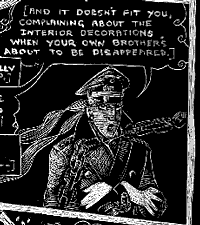>> The Friday Review: Seven Peaches/Charger
>> Like Clockwork: An interview with Jane Irwin
More...

 Writer/Artist: Donna Barr
Writer/Artist: Donna Barr
Publisher: A Fine Line Press
SEVEN PEACHES
Collecting DESERT PEACH #1-7
Price: $19.95
ISBN: 1-892253-12-7
CHARGER
Collecting STINZ volume I #1-5, volume II #1-3
Price: $20.00
ISBN: 1-892253-03-8
Considering the US's current adventures in Iraq, I thought it would be appropriate to review some war comics. What better way to prove the medium's relevance than by exploring its representation of one of humanity's biggest problems?
Both DESERT PEACH and STINZ are definitely war comics, but of a decidedly different stripe than, say, the comic journalism of Joe Sacco. Let's call them German fantasy war comics. These best known titles of Donna Barr reflect the author's own experience in the US Army and her lifelong fascination with Germanic culture.
SEVEN PEACHES contains the first seven episodes of DESERT PEACH, named for its protagonist Pfirsich Rommel, the fictional brother of Panzer Commander Erwin 'The Desert Fox' Rommel. Pfirsich (literally, 'Peach') is a flaming humanitarian and colonel in the German Afrika Korps during World War II.
Since the idea of a comedy about a gay Nazi might strike some readers as distasteful or at least problematic, it should be pointed out none of the main characters in DESERT PEACH are registered members of the National Socialist Party, as Barr goes to great length to demonstrate in the fourth issue, "Is There a Nazi in the House?" It was possible to serve in the German military without being a Nazi, and Pfirsich's men are all of this breed. The only espouser of Hitler's rhetoric is a harmless poseur, and the only registered party member is a confused Jew who mistakenly joined in an effort to get free drinks.
 The rest of this unit of misfits includes a mute radio officer, a shell-shocked mental case with a pet landmine, a French-speaking black Moroccan, an American prisoner of war, and a Cossack mercenary. In this context, a gay colonel engaged to marry a hotshot Luftwaffe ace does not seem out of place.
The rest of this unit of misfits includes a mute radio officer, a shell-shocked mental case with a pet landmine, a French-speaking black Moroccan, an American prisoner of war, and a Cossack mercenary. In this context, a gay colonel engaged to marry a hotshot Luftwaffe ace does not seem out of place.
Of course, the Nazis notoriously exterminated homosexuals, purging even their own ranks. Though there were undoubtedly more than a few closet cases in the Reich, a flamboyant character like Pfirsich wouldn't likely have lasted long in reality. The one time that this unpleasant fact intrudes, it is quickly dismissed. Issue #2 opens with the Peach locked up in a Berlin dungeon for the crime of being "his type". However, his no-nonsense historical figure of a brother quickly liberates him by literally kicking down the confining walls of the panel. The inky shadows of imprisonment drain from the page and the pair are quickly transported back to sunny North Africa, far from that particular persecution. In the next issue the brothers Rommel strip naked and go surfing in an ill-conceived attempt to scout for Allied submarines.
The book's distance from reality is as far as Pfirsich's North African unit is from the war's major theatres of combat. But despite being a fantasy, DESERT PEACH does not treat World War II as mere backdrop. As far as military comedies go, DESERT PEACH has more in common with M*A*S*H than HOGAN'S HEROES. It's funny, but people are shot and sometimes killed. The stark contrast of abrupt violence against the carefree attitudes of the characters makes the Peach's precarious oasis of tolerance in the desert of war all the more poignant.
CHARGER: THE WAR STORIES collects eleven early STINZ stories.
 Steiner "Stinz" Lowhard is a young centaur recently enlisted in an army that vaguely resembles Germany's during World War I. In addition to being the army's only centaur, Stinz is a country boy out of his element. Stinz's centaur people are portrayed as an ethnic minority largely confined to a single valley, so the differences between Stinz and his fellow recruits are just as much cultural as they are physiological.
Steiner "Stinz" Lowhard is a young centaur recently enlisted in an army that vaguely resembles Germany's during World War I. In addition to being the army's only centaur, Stinz is a country boy out of his element. Stinz's centaur people are portrayed as an ethnic minority largely confined to a single valley, so the differences between Stinz and his fellow recruits are just as much cultural as they are physiological.
The opening issues are mostly concerned with the problems facing a 'four-legger' in a 'two-legger' army. How does a centaur who eats grain survive on military rations? How does he march in step or do push-ups?
But centaurs aside, STINZ, is probably less of a fantasy than DESERT PEACH. Whereas Pfirsich is merely the leader of a varied crew of free spirits and outcasts, Stinz is his unit's only dark horse. Whereas Pfirsich treats war as a troublesome bother, Stinz treats it as an honourable duty.
The depiction of war is different as well. All combat depicted in CHARGER happens in flashback, and is surprisingly brief. However, the contrast between the cocky and enthusiastic young colt and the hard drinking middle aged farmer with a rocky marriage speaks untold volumes about the effects war has on Stinz. And even in its brevity, CHARGER is certainly more brutal than PEACH.
Perhaps the most affecting episode occurs when Stinz's platoon has to exterminate a group of horses that have come down with anthrax. Watching the combat virgins having to coldly execute apparently healthy creatures would have been disturbing enough even if one of their number wasn't himself half a horse, but Barr's contrivance only makes it more sad.
In case it hasn't become clear enough already, both these works are rather good. Both titles reflect Barr's gift for telling engaging and plausible fantasy, and the black and white artwork is strong and unique - though at times the layout is cluttered to the point of distraction, requiring the use of arrows to tell the reader which panel to follow.
Both books are also audaciously funny, and often strangely touching, and though the premises may seem outlandish, their compassion and guarded hope make them more relevant than one might expect.

This article is Ideological Freeware. The author grants permission for its reproduction and redistribution by private individuals on condition that the author and source of the article are clearly shown, no charge is made, and the whole article is reproduced intact, including this notice.


